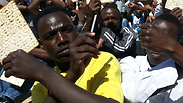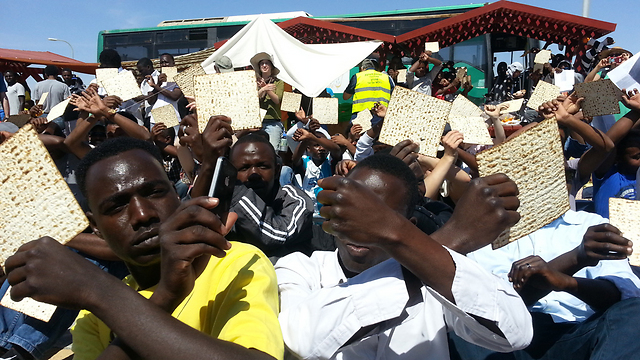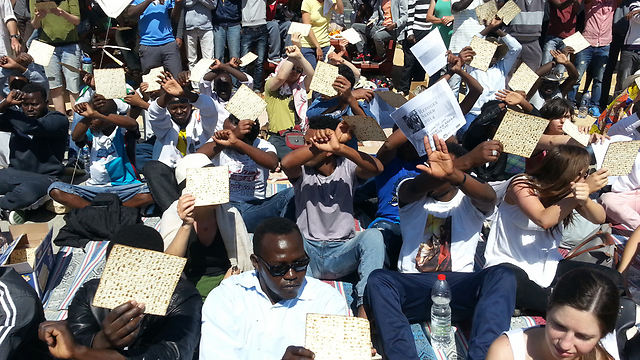
'Like the Jews, we also crossed the Egyptian desert, but we are not free here.'
Photo: Roee Idan
More than a hundred African asylum seekers and human rights activists came together Friday to hold an alternative Passover Seder at the Holot Detention Center
– the 'open jail' currently housing more than a thousand African refugee seekers.
The participants were joined by the detention center's residents, and together read parts of the Passover 'Haggadah' – a semi-religious text detailing the order of the Passover meal (or Seder) and the biblical story of the exodus of the Israelites from slavery in Egypt to freedom in the promised land.
Thus the event's organizers attempted to highlight similarities between the plight of the biblical Israelites and those of the African asylum seekers, who also crossed Egypt to reach Israel.
'Like Jews, we also crossed the desert' (Photo: Roee Idan)
The ceremony was conducted in Hebrew but was simultaneously translated into Arabic for the Sudanese and Tigrigna for the Eritreans.
Israel opened the Holot complex last December after the Supreme Court shot down an article in the Infiltrators Prevention Bill which allowed the practice of jailing illegal migrants – or infiltrators as the government and asylum seeker detractors call them – for up to three years in regular prisons.
But in what the migrants called a cruel twist and rights groups said was a rights violation, another law passed the same month allowing the migrants to be detained indefinitely, pending the resolution of their requests to stay in Israel.
Kushma, an Erithean asylum seeker who has been in the Holot for two months spoke of the event and its significance: "We read about the Israelites crossing the desert to escape slavery – its is an inspirational story which gives hope that one day we will also win our freedom."
Related stories:
- Thousands of Africans protest at Interior Ministry over jail policy
- Asylum seekers urges Supreme Court: Reject new infiltration law
- Israel official: Africans agree to go to Uganda
Kushma does not know when he will leave Holot, as his release from detention is contingent on Israel's response to his refugee status: "The people who came here today encourguse us and give us hipe that there are people in Israel who care. Being in a detention center that is in the middle of the desert is very depressing, we can leave put only for a few hours and we have nowhere to go. The athorities claim this is not a prison, but we are not free."
"The goal is to sit together, Israelis and asylum seekers, and celebrate the holiday of liberty (as Passover is sometimes referred to in Hebrew) in the light of universal values," Israeli activist Adi Drori-Abrahm explained.
According to her, "much like we Israelis celebrate the exodus from slavery in Egypt to freedom and liberty, we need to remember that among us there are thousands of people who have crossed the desert, fleeing from danger, only that now they are jailed."
The Seder held Friday near Holot is one of three such events being held this week; another will be held in Tel Aviv's Levinski Park, an area in southern Tel Aviv which is home to the majority of Israel's refugee seekers; and another one will be held in Washington DC.
In the upcoming weeks a special panel of the Supreme Court will decide whether the new Infiltration Prevention Act – formulated in wake of the court's previous ruling – is legal, or constitutes an infringement of Israel's Basic Law of Human Dignity – a law of constitution-like legal standing.
Holot is now home to more than 1,500 African asylum seekers, and over 4,000 have been summoned to the facility. The government estimates it will eventually house some 3,000 migrants.

















